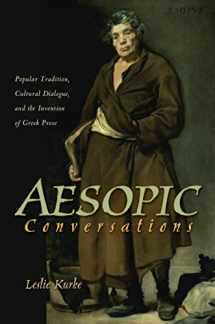
Aesopic Conversations: Popular Tradition, Cultural Dialogue, and the Invention of Greek Prose (Martin Classical Lectures, 26)
Book details
Summary
Description
Examining the figure of Aesop and the traditions surrounding him, Aesopic Conversations offers a portrait of what Greek popular culture might have looked like in the ancient world. What has survived from the literary record of antiquity is almost entirely the product of an elite of birth, wealth, and education, limiting our access to a fuller range of voices from the ancient past. This book, however, explores the anonymous Life of Aesop and offers a different set of perspectives. Leslie Kurke argues that the traditions surrounding this strange text, when read with and against the works of Greek high culture, allow us to reconstruct an ongoing conversation of "great" and "little" traditions spanning centuries.
Evidence going back to the fifth century BCE suggests that Aesop participated in the practices of nonphilosophical wisdom (sophia) while challenging it from below, and Kurke traces Aesop's double relation to this wisdom tradition. She also looks at the hidden influence of Aesop in early Greek mimetic or narrative prose writings, focusing particularly on the Socratic dialogues of Plato and the Histories of Herodotus. Challenging conventional accounts of the invention of Greek prose and recognizing the problematic sociopolitics of humble prose fable, Kurke provides a new approach to the beginnings of prose narrative and what would ultimately become the novel.
Delving into Aesop, his adventures, and his crafting of fables, Aesopic Conversations shows how this low, noncanonical figure was--unexpectedly--central to the construction of ancient Greek literature.


We would LOVE it if you could help us and other readers by reviewing the book
Book review



